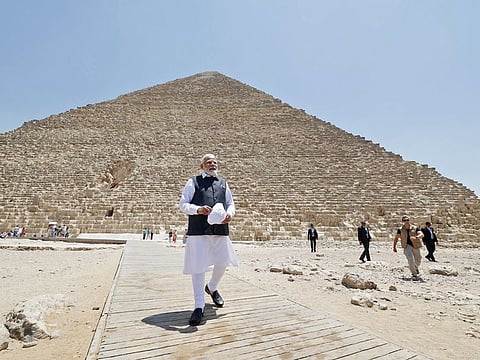Strengthening Indo-Egyptian Partnership: Prime Minister Narendra Modi's Visit to Egypt
India-Egypt can forge ahead to strengthen their strong, mutually beneficial relationship

While most of the media attention has been focussed on Indian Prime Minister Narendra Modi's hugely successful visit to the United States, his stopover in Egypt is immensely noteworthy.
Modi’s two-day state visit on 24th and 25th June, after a long gap of twenty-six years, was also hugely significant. It not only consolidated Indo-Egyptian ties, but strengthened India's position as a leader in the global south.
India and Egypt have a long-standing bilateral relationship, rooted in their ancient civilizations. The Indus Valley civilization and Nile valley civilisation coexisted and traded with each other.
In the contemporary era, Egypt’s role and influence in Africa and the Arab world, as well as its potential as a gateway to the African markets and a partner in development cooperation, have contributed to the deepening of India’s relations with Egypt over the years.
Diplomatic relations between the two nations were established on August 18 1947, just three days after India’s independence. But even prior to that, Mahatma Gandhi and Saad Zaghloul enjoyed a shared vision for the independence from colonial power of their two nations.
This continued in the close friendship between Prime Minister Jawaharlal Nehru and President Gamal Abdel Nasser, resulting in the Friendship Treaty between the two countries in 1955. Since then, various high-level visits and exchanges have taken place to strengthen ties.
Historical connections
Both countries have a rich cultural heritage and historical connections, providing a solid foundation for mutual understanding and cooperation. During the Suez Crisis in 1956, India offered crucial support to Egypt.
Most notably, India and Egypt were the founders of the Non-Aligned Movement (NAM) in 1961 in Belgrade, along with Ghana and Indonesia. During the bipolar era of the Cold War, when most nations aligned themselves with either of the two superpowers, joining either the US-led NATO or the Soviet-led Warsaw Pact, India and Egypt helped form the largest bloc, after the United Nations, of 120 nations who preferred officially not to take sides. In 1978, India also granted Egypt the “Most Favoured Nation” trading partner status.
Renewed bilateral ties
After Modi assumed office as India’s prime minister in 2014, efforts were once again renewed to improve ties. Earlier this year, Egyptian President Abdel Fattah Al Sisi was the chief guest at India’s Republic Day celebration on January 26.
During his speech at Hyderabad House, he said, “Strengthening cooperation in the defence field is the best proof of the common will to inaugurate a strategic relationship between the two countries.”
Al Sisi also invited Modi to Egypt. During Modi’s current visit, he was not only awarded Egypt’s highest civilian honour, the Order of the Nile, by President Al Sisi but both leaders signed a pact to elevate the relationship between the two countries to a “strategic partnership.” In addition, four other MoU were also signed to enhance trade and defence ties.
Bilateral trade between the two countries has rapidly grown to over 7 billion dollars, with India emerging as Egypt’s 6th largest trading partner. Egypt controls the Suez Canal, a crucial channel to the Mediterranean Sea. Nearly 12% of the world’s trade flows through this route.
With a population of over 105 million Egypt is also the largest Arab state in the world. Besides, sitting right at the top of Africa, with close proximity to the Middle East, it enjoys a tremendous strategic location vis a vis both these geographies, which are vital to India’s interests.
Modi visit not only included the obligatory trip to the Giza Pyramid, perhaps the greatest wonder of the ancient world, but also to the historic 11th-century Al-Hakim Mosque in Cairo. Modi also paid tribute to Indian soldiers slain during World War I at the Heliopolis War Cemetery.
Re-invigorated relations
In his customary outreach to the Indian diaspora, Modi also made it a point to have a meeting with the influential Dawoodi Bohra community, one of his early and consistent supporters from among India’s Muslims.
As the world order evolves into a multipolar configuration, with shifting geopolitical and economic dynamics, India’s deepening relations with Egypt, a populous and influential actor in the region, will play a significant role to enhance global peace and prosperity. India must enhance its engagement, cooperation, and presence in Egypt and other Arab countries to safeguard its interests and position.
The just-concluded state visit by Prime Minister Modi, with high-level meetings, cultural interactions, and discussions on key areas of cooperation, such as trade, defence, agriculture, and tourism, has re-invigorated the Indo-Egyptian partnership.
India and Egypt can now forge ahead to strengthen their strong and mutually beneficial relationship in the years to come.
Sign up for the Daily Briefing
Get the latest news and updates straight to your inbox



